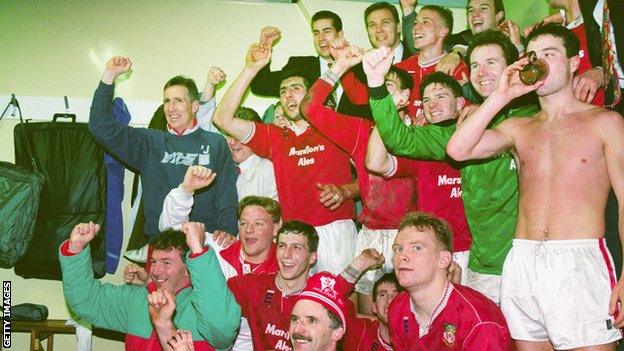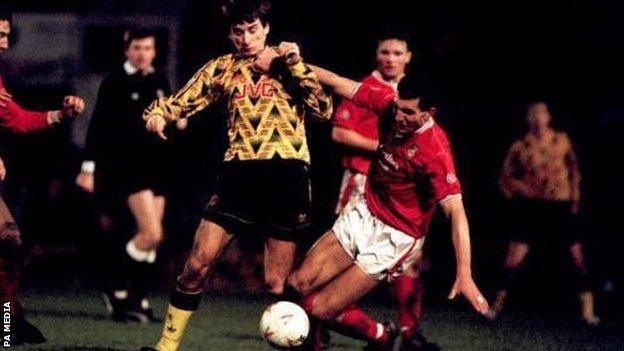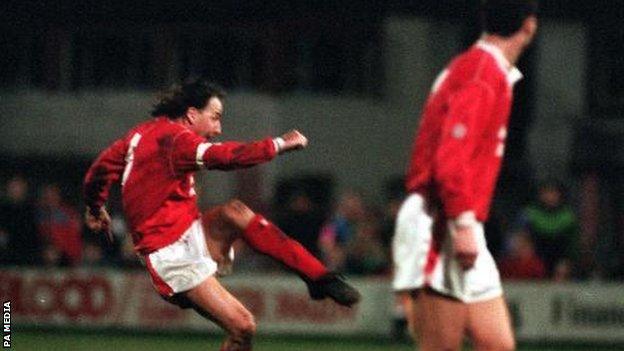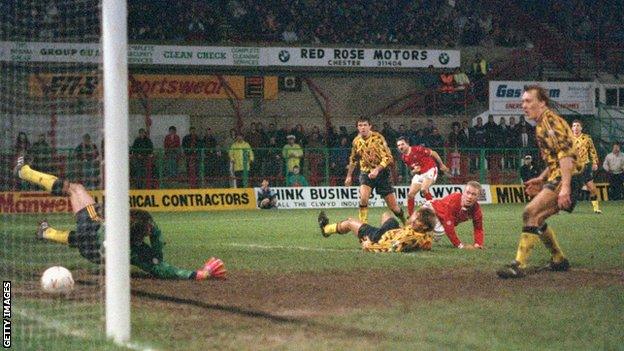FA Cup: When Wrexham shocked Arsenal in 1992
- Published

Wrexham players and staff celebrate victory over Arsenal in January 1992
It has been hailed as the biggest FA Cup shock of all time.
A third-round meeting between two teams that were poles apart - 90 places had separated them in the English Football League the previous season - fired the imagination.
Few gave lowly Wrexham any hope against mighty Arsenal on 4 January, 1992, but it's a game which has become part of footballing folklore.
BBC Sport Wales reflects on the day 30 years ago when the Welsh minnows shocked the north London giants.
THE BACKGROUND
The previous 1990-91 season had seen the two clubs finish at opposite ends of the Football League.
Arsenal were crowned First Division champions, their second title in three seasons under manager George Graham.
Goalkeeper David Seaman had joined Arsenal from QPR at the start of that season.
"We knew how to win and we knew a way of playing that suited us all," Seaman recalls of a team boasting the likes of Tony Adams, Paul Merson, Alan Smith and the late David Rocastle.
"That's why we became so successful. People say 'Boring Arsenal' or even the song '1-0 to the Arsenal'.
"Once we scored we knew we could defend that lead and we had a lot of wins at 1-0."
In contrast, Wrexham had ended the 90-91 campaign bottom of the Fourth Division.
In any other season Wrexham would have been relegated to the Conference but they were spared that fate due to Football League re-organisation.
Without the spectre of relegation, Wrexham manager Brian Flynn used the season to blood a number of promising youngsters such as Gareth Owen, Waynne Phillips, Lee Jones, Phil Hardy and Steve Watkin.

Arsenal's Alan Smith in action against Wrexham's Mark Sertori
"These players would play 30-35 games in a season and what was guaranteed over a season is that they would be inconsistent and we'd have a rollercoaster run," Flynn recalls.
"But we knew that the following season things would pay off for us and with that season they played, added to some exceptional experienced players, would help the youngsters come through."
Former Wales internationals Gordon Davies and Mickey Thomas - who had previously left Wrexham for Manchester United in 1978 at the start of a nomadic career - joined at the beginning of the 1991-92 season.
League form was again indifferent and Wrexham were among the lower reaches of the Fourth Division, but progress was made in the FA Cup.
Victories over non-league sides Winsford United and Telford United saw Wrexham reach the third round - their reward was a home tie against Arsenal.
"When the draw was made I remember thinking 'that's it, that's the end of our run'," recalls Thomas.
"You look for shocks, but when that draw was made I wasn't confident."
Arsenal were favourites not only to advance past Wrexham, but also to win the competition that season.
"You don't think easy, but that's a decent draw," Seaman says of the reaction when the names were pulled out.
"You never underestimate an opponent, especially when you're playing them away," Seaman reflects.
"You know results like this can happens but the biggest thing is that you don't want it to happen to you. Let's make sure we get our heads right and we win this game."
For Wrexham's youngsters such as striker Watkin, the game on 4 January, 1992 would be their first in front a full capacity Racecourse Ground.
"We were looking forward to the game," said Watkin, who was 21 at the time of the game.
"It was a great platform for the young players
"Not in our wildest dreams we thought we could even get a draw out of the game."
THE GAME
Arsenal dominated the first half at the Racecourse but despite a plethora of chances only scored one goal.
Alan Smith struck home from close range from Paul Merson's pass to put them ahead a minute before the interval.

Wrexham's Mickey Thomas, who played for Manchester United in the 1979 FA Cup final against Arsenal.
"I have to say that in the first 45 minutes they absolutely battered us," admitted Thomas.
"In the FA Cup you have to have a little bit of luck - we had a monster amount of luck that day because they could have scored four or five, but they only got the one goal.
"As I'm walking off I'm thinking, 'I'm not looking forward to the second half.'
Flynn however remained calm and composed as he delivered his half-time team talk.
"I said to the players 'stay in the game - something's always going to happen,'" Flynn recalls.
Arsenal found it hard to get back into any kind of rhythm after the break and failed to add to Smith's opener.
With eight minutes remaining, Wrexham were awarded a free-kick after Davies was fouled by David O'Leary on the edge of the area.
It was the veteran Thomas who stepped up.
"They say it wasn't a foul," says Thomas. "But it went in our favour and this was the chance to maybe get a goal.
"Initially I said to Waynne Phillips who was stood to the left of me 'pass me the ball.'
"Then I looked at the situation and then said 'no, leave it. Leave it me.'
"I looked and we had two players in the wall and my job was to aim for that gap they're going to leave and as I've run up to it I've struck it.
"As soon as I hit it I could see it was going into the right hand corner but Seaman gets his fingertips to it but can't stop it."
Seaman was helpless to stop Thomas' strike.
"As soon as he hit it I knew I wasn't getting it," the ex-England international says.
"When I look back at it I think 'why did you dive? Why did you bother? Because it was going into the top corner right from the off.
"It was such a sweet strike."
With eight minutes remaining Wrexham were back in the game and with it the prospect of a lucrative replay in north London the following week.
"The dream scenario was draw with Arsenal and get a good gate at Highbury in midweek," Flynn says.
"If we'd have 30,000 at Highbury it could have come to half a million pounds which was revenue which we not only needed but would have been invested in the right way.
"When Steve scored it scuppered that."
Two minutes after Thomas' equaliser, Watkin, one of the youngsters given his opportunity the previous season, slid in to score the winner.
"Tony Adams, the best centre half in the country and an England player slips and it's a goal," Flynn adds.
Watkin jokes that it was a "scruffy goal" but the most important of his career.
"I knew it was in before anyone else and knew it was in before the noise," says Watkin, reflecting on his goal.
"A few second later the noise hits you and then you just run off.
"It's a great feeling scoring a goal anyway but scoring in a game like that was just extra special."
Wrexham's players were mobbed by supporters who raced on to the pitch at the end of the game, with Arsenal stunned.
"We did a job on them," Thomas says looking back on that Saturday afternoon in north east Wales.
"How did we do it? It was a miracle, it was unreal. It's 30 years and they're still talking about it and they'll be talking about it when I'm gone."
For all associated with Arsenal it's a day that they would rather forget.

Steve Watkin scores past David Seaman to secure a famous victory for Wrexham
"When I look at that team I think 'how did we lose?' But we had a bit of an off day," adds Seaman, who would go on to win the FA Cup four times with the Gunners.
"But it's the beauty of the FA Cup.
"Wrexham will never forget that game - and neither will I!"
Flynn is no doubt - Wrexham beating Arsenal is the competition's greatest ever giant-killing act.
"I'd say it was the biggest David v Goliath cup shock ever because of the circumstances surrounding it," says Flynn, who also managed Swansea City and Doncaster Rovers.
"What it did for Wrexham, it made the club financially stable and allowed me to use it for the benefit of the long term future of the club."
Listen to a documentary marking the 30th anniversary on Radio Wales Sport, Friday 7 January from 19:00 GMT

SLAMMED: The story of Wales’ transformation from rugby rejects to rugby royalty
STORIES FROM WALES : Documentaries for curious minds
